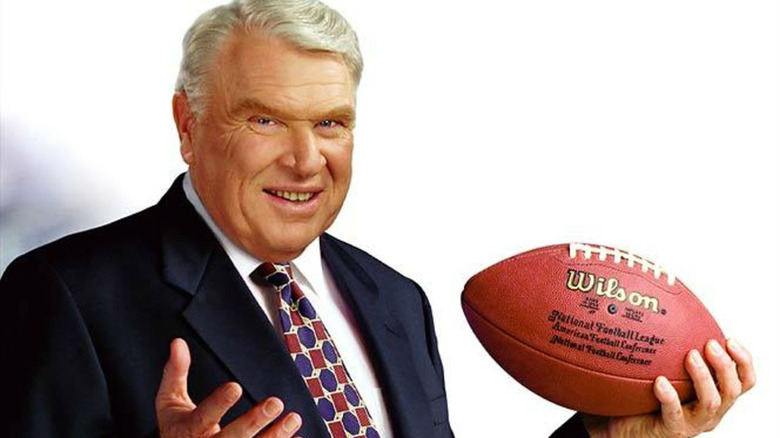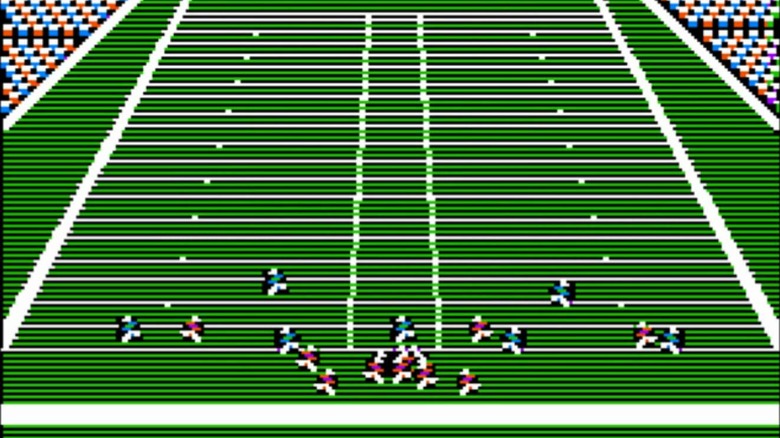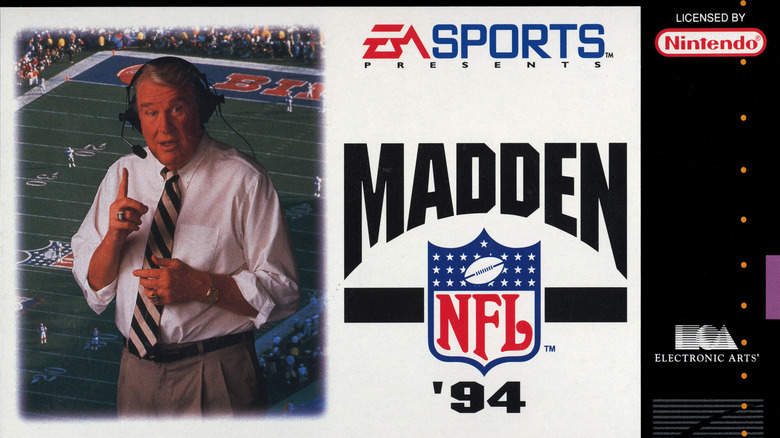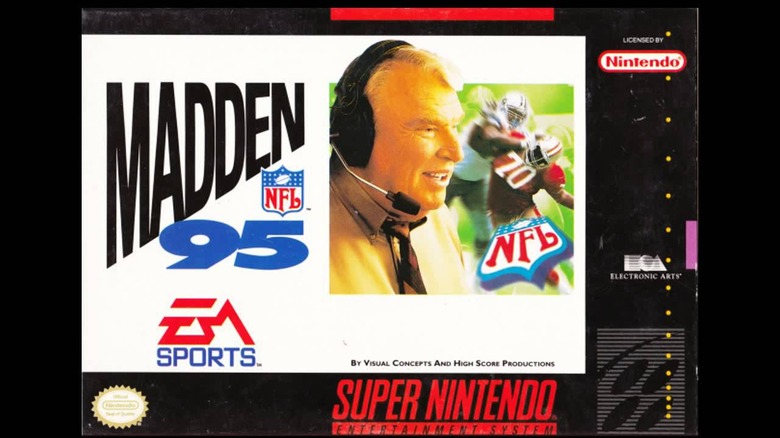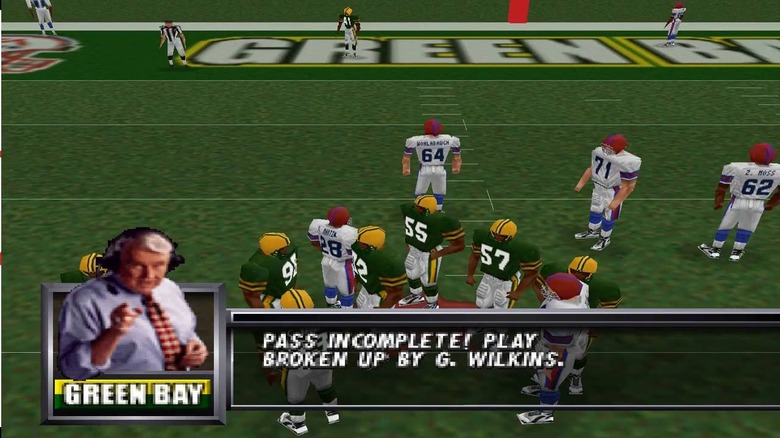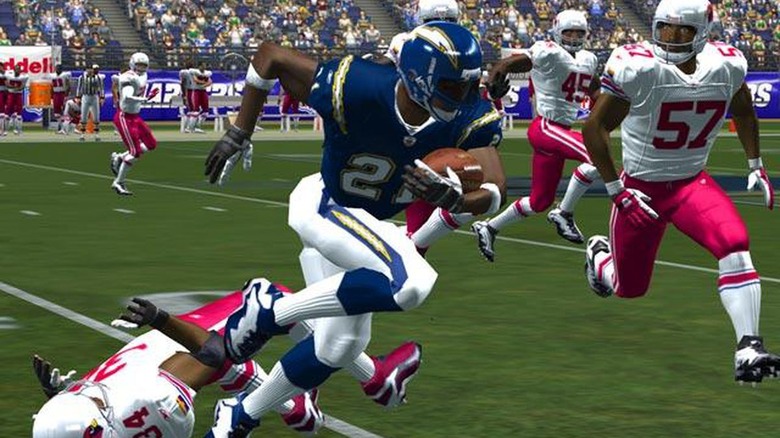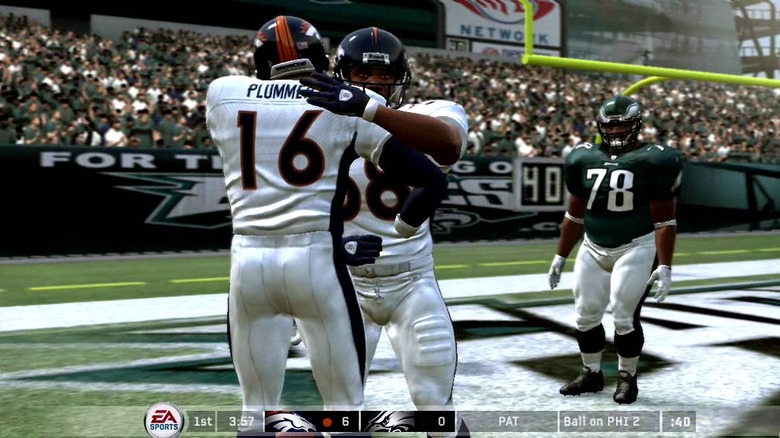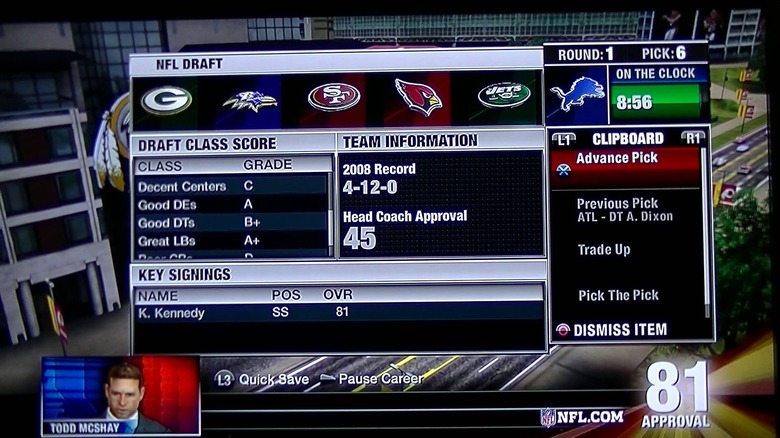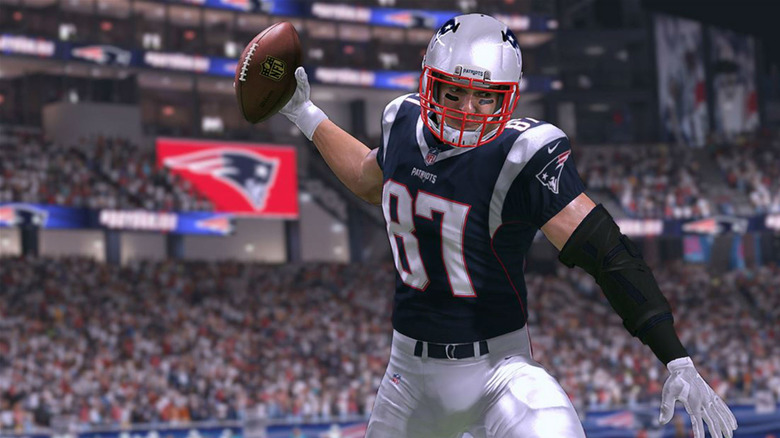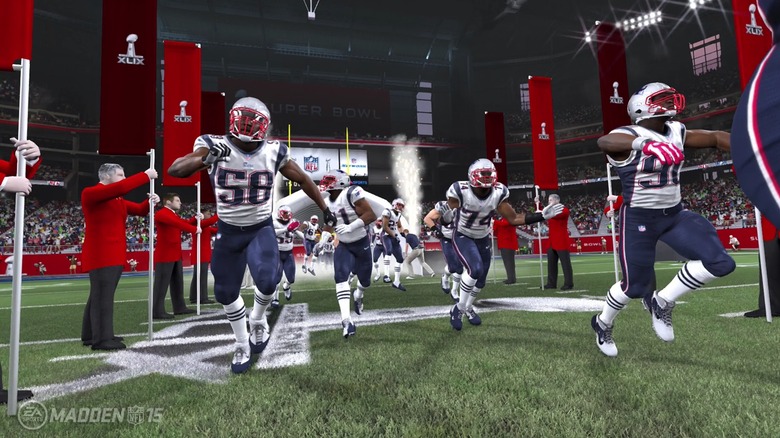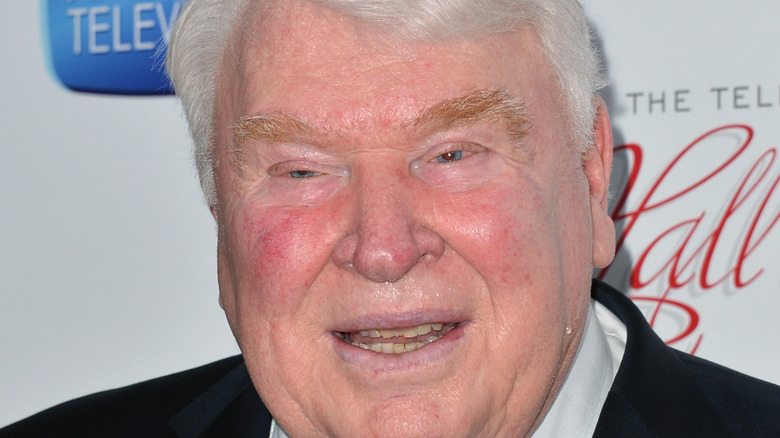The Untold Truth Of Madden NFL
When it comes to sports video games, there may not be a longer-running, more storied franchise than the Madden football series. Since their introduction nearly three decades ago, the Madden games have become larger than life — much like the man whose name is plastered on the front cover. They're played professionally. They're almost always the best-selling games of August. And players are just as excited for a new Madden as everyday fans are — sometimes to the point that they brag or complain about their in-game stats.
But it hasn't always been smooth sailing for Madden football games. Nor have the good times been boring. There's a whole lot of history regarding EA's football series that you're probably not aware of, and below, there's a chance you'll learn some things for the very first time.
From John Madden Football to Madden NFL 19 and everything in between — here is the untold truth of Madden NFL.
The first John Madden Football was released for the Apple II
The long-running Madden series starts in a place you might not expect. By now, you're probably used to seeing EA's annual football release on consoles like the Xbox One or PlayStation 4. And in years past, earlier Xbox and PlayStation generations have been the home of football's flagship title. But the very first Madden game didn't debut on a game console at all.
Instead, 1988's John Madden Football first made its home on the Apple II computer.
Those who played Madden games in the '90s might remember the series' more arcade-focused approach to the game of football. But the first title in the franchise wasn't arcadey at all. John Madden, the legendary coach and sportscaster who lent his name to the game, was adamant that John Madden Football be almost as much a strategy title as a sports title. And he absolutely would not, under any circumstances, accept a game that did not offer 11 vs 11 action.
And here's a fun tidbit you might not be aware of regarding John Madden Football. EA required some development help to get the game out the door. The studio it turned to for help? Bethesda Softworks.
The first several Madden games did not have the NFL license
The Madden series and the NFL are like peanut butter and jelly. They just go together. When you pick up the latest Madden title, you wouldn't be crazy to expect official NFL teams, real-life players, realistic stadiums, and playbooks that match the schemes used by NFL coaches.
But Madden did not always have the NFL license. In fact, the first few games in the series were released without it.
Madden '94 was the first title to feature official NFL branding. That meant the game could proudly display the NFL shield logo on its box and cartridge art — an obvious draw for football fans. Not only that, having the NFL license meant that players could use their favorite team and get to see official uniforms with team logos. There would be some hiccups along the way, but the Madden franchise has otherwise kept a vise-like grip on the NFL license. It's a big part of why Madden is one of the most popular titles in EA's stable, and why millions of players line up to buy it every year.
Madden was set to launch on the PlayStation in 1995, but missed
Born out of a failed partnership with Nintendo, the Sony PlayStation became an instant sensation when it launched at the end of 1994. For a first effort, it had a great lineup of first party games, as well as the promise of substantial support from third parties. EA was one of those third-party studios, and the company fully intended on releasing a version of Madden for the PlayStation when football season came around in 1995.
Unfortunately, it never happened.
EA had previously entrusted a studio called Visual Concepts with the SNES version of Madden NFL '95, which released in 1994 (confusing, we know). Because Visual Concepts did such a good job with that game, EA felt comfortable handing the studio the reins to Madden NFL '96 on the PlayStation. But there was a problem: several developers from Visual Concepts had quit prior to the Madden deal, and those who moved up the ranks bit off way more than they could chew in terms of scope. They wanted to key in on bells and whistles, like full color commentary and video clips featuring John Madden and his broadcasting partner, Pat Summerall. But the team was way too inexperienced with the PlayStation hardware to make it happen.
Madden wound up skipping the PlayStation in 1995. But it returned in 1996, and hasn't missed a year on a PlayStation console since.
The series had a strange release on the Nintendo 64
Before you jump to conclusions — no, Madden 64 was not a 1960s-era version of Madden. Like many other Nintendo 64 games at the time, the first release of Madden on the N64 decided it, too, would append a "64" onto the end of its title. But that's not even the weirdest bit about this particular version of Madden. You may have noticed that the game is called Madden 64 and not Madden NFL 64. There's a very good reason for that.
EA somehow failed to secure the NFL license for Madden 64 in 1997 ... despite releasing Madden NFL '98 on several other platforms that year.
If you've never seen an unlicensed game of Madden before, you're not missing all that much. Madden 64 had the look of a typical NFL game, and played with the same rule set as NFL football. The game just couldn't feature any team logos, and for some reason, had to use very specific city names for teams like the New England Patriots — called "Foxboro" in this instance.
Despite being an alright football game, Madden 64 couldn't help but feel watered down due to the licensing issue. Fortunately, EA got things squared away for all future releases.
Madden had a serious challenger in Sega's 2K series ...
Here's a fun comeback story that is all-too-fitting for an article about a sports franchise. You might remember Visual Concepts, the studio that was tasked with — and ultimately failed at — getting Madden NFL '96 onto the PlayStation. After that debacle, EA brought a studio called Tiburon in to handle most of its Madden titles going forward. But gamers hadn't heard the last of Visual Concepts. Not at all.
The studio was later purchased by Sega to develop exclusive sports titles for the Dreamcast. And from that, we got the NFL 2K series.
The early NFL 2K games were some of the best on the market. They were so good, in fact, that Sega remained a fixture in sports long after the Dreamcast perished. In 2004, Visual Concepts achieved what could only be described as a hostile takeover with NFL 2K5. Many considered it the best football video game ever made, and on top of that, the game was aggressively priced at $20 — a third of Madden NFL 2005's MSRP. There appeared to be a new king in town with regard to NFL video games.
EA was not pleased. So EA did something about it.
... and stomped that challenger out
The release of NFL 2K5 was a real wake-up call for EA and its Madden franchise. The Madden games had generally skated by on name recognition, doing very little in the way of adding new features or pushing the genre forward. But the 2K fan base grew larger with every new release, and the polish on display in NFL 2K5 — along with its super low price — finally put Madden on notice. It was clear EA needed to step up its game to meet 2K's challenge.
EA responded by inking a deal to become the exclusive developer of NFL video games. Just like that, the NFL 2K series was officially dead.
Mike Mika, a prominent game developer, spoke with ESPN about some of the industry dominoes that fell after EA secured its exclusive licensing deal.
"It was like a nuclear bomb going off in the game industry," Mika said. "All these people who assumed they would be able to renew their license with the NFL had to drop everything they were doing. You had development houses cancel their games, and some places go out of business. Overnight, Madden reclaimed the throne without having to lift a finger on the development side."
Madden spun off a weird coaching-only title
To EA's credit, the company did start to branch out and experiment with the Madden series after locking down its exclusive NFL rights. For instance, EA released a pared-down, 4v4 arcade version of Madden that was aptly titled Madden Arcade in 2009. But there's another Madden series spin-off that is far more strange — because it took what some players enjoyed doing in mainline Madden games and created a whole new franchise out of it.
We're talking about NFL Head Coach, a game where you could call plays, make personnel decisions, and ... yeah, that's about it.
What made the release of NFL Head Coach so strange was that, in 2006, the features found in that standalone game weren't exactly gone from the Madden NFL titles. A lot of players enjoyed the franchise aspects of Madden, often drafting players and allowing the computer to simulate games. What NFL Head Coach did was put more emphasis on the coaches themselves while offering a slightly tweaked experience as a full and separate retail release.
NFL Head Coach didn't last long, only showing up for two years before getting cut. But EA was sure to implement even more franchise options in its Madden games to appease sim-minded players afterward.
Any player who appears on a Madden cover is cursed (probably)
Are you the superstitious type? You know, the kind of guy or gal who won't open an umbrella indoors, shrieks at the sight of a black cat, or avoids every crack on the sidewalk? If so, you can thank your lucky stars you aren't a talented NFL player, because you'd probably buy into the Madden curse.
What's a Madden curse, you ask? It's the belief that any player featured on the cover of a Madden NFL game is doomed to have a terrible season.
Superstitions like these don't just appear out of nowhere, and if you look at some past cover athletes, you can certainly make the case for a curse existing. Garrison Hearst missed two seasons after getting his cover in 1998. Daunte Culpepper, the Madden cover star in 2001, fell victim to a season-ending knee injury. Future Hall of Famer Ray Lewis tore his hamstring after appearing on the Madden cover in 2004. And more recently, Rob Gronkowski of the New England Patriots made the cover in 2016 — and hit the Injured Reserve list just a few months later after injuring his back.
Is the curse real? Or is football just a dangerous sport where injuries aren't that uncommon? That depends. Are you the superstitious type?
In 2015, Madden became psychic
The Madden series has come a long way in its decades-long history, now sitting alone atop the world of football video games as the most sim-like experience available. A lot of work goes into every aspect of Madden, from adjusting player stats to understanding the tendencies of NFL coaches. And this focus on the finer details makes Madden great for predicting how an actual NFL game might play out.
Every year, Madden is used to simulate the upcoming Super Bowl. And the game has a pretty good track record when it comes to picking winners. But Madden was never as spot on as it was in 2015.
If you're a follower of the NFL, you might recall that 2015 was the year the New England Patriots faced off against the Seattle Seahawks. The game is famous for its mystifying lack of Marshawn Lynch in the contest's closing seconds, but even more remarkable is how accurately Madden was able to simulate the game beforehand. Madden correctly picked the New England Patriots as the victor — but that's not all. Madden also managed to nail the final score exactly. The Madden simulation had the Patriots winning 28-24. And the final score of the actual NFL game? 28-24, New England.
John Madden remains heavily involved in the development of Madden games
When it comes to playing, coaching, and commentating, John Madden has been out of the NFL game for a while. The one-time player turned legendary coach found success later in life as a TV personality for Fox and, later, NBC. But he called his last game back in 2009, and the NFL world has felt a little emptier ever since.
Fret not, Madden fans — especially if you're someone who plays a lot of EA's Madden NFL games. Because John Madden hasn't quite retired from football entirely. He's still very much a part of Madden NFL's development every single year.
"Last year, we got a call from John Madden himself where he says, 'Guys, the PAT is under review, it's going to be a 33-yard kick now,'" Seann Graddy, a Madden producer, told Games Radar. Yes, Coach Madden still stays current on NFL rule changes. And he make sure the team at EA gets them right — it's his name on the game, after all.
But that's not all. On top of randomly calling EA to fill them in on important league changes, Madden meets with the development team at least once a year to check out the game's design.

